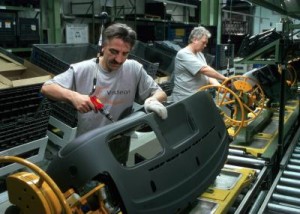Union members in Baden-Württemberg, one of the most prosperous regions of German and the home of companies such as Daimler AG, Porsche and Bosch, appear to have gained a major bargaining victory, gaining a 4.3% pay increase and a reduction of the average work week to allow more time off for family leave.
The deal between IG Metall and the Suedwestmetall employers’ federation, which represent the employers, including major carmakers, calls, for workers in Germany to get a 4.3% pay increase April starting April 1.
The workers will also receive other payments spread over the following 27 months until 2020, IG Metall’s Roman Zitzelsberger told reporters at the conclusion of the talks.
Employees with children up to 8 years of age, caregivers and in stressful working time systems such as shift work can for the first time decide for 2019 alternatively for “eight tariff exemption days” instead of the additional money, according to a series of tweets from the German Metalworkers union, IG Metall.
(German union digging in for tough negotiations. Click Herefor the story.)
Occupancy is staggered but the impact is to reduce the average work week from 35 to 28 hours per week.
Workers will be allowed to reduce their working week from the standard 35 hours to 28, while preserving the right to return to full-time work. Employers successfully resisted IG Metall’s demand that workers receive the same, or similar, pay for fewer hours worked a week.
Labor contracts in Germany are negotiated regionally but the new agreement is expected to collective bargaining agreement in Baden-Württemberg is expected to serve as the model in other parts of Germany where companies such BMW, Volkswagen, Audi and Ford as well as dozens of suppliers are also facing pressure to raise wages.
(Click Here to see more about German workers readying for “warning strikes.”)
IG Metall, in order to protect its contracts, is also expected to press unions in other parts of Europe to also seek higher wages in future negotiations to win a larger share of the European auto industry’s newfound prosperity.
The settlement in Baden-Wurttemberg follows a series rolling warning strike that began last month. The warning strikes began with brief walkouts at major employers earlier last month but escalated last week into longer 24-hour strikes at key employers such as Porsche, Volkswagen, BMW and Mercedes-Benz, Ford and a number of suppliers.
The union also warned that even longer strikes could be in the offing if the employers didn’t step up and start negotiating in good faith on key items such as more pay and a shorter work week.
(Is the ground collapsing under the UAW? For more, Click Here.)
The union backed off from its demand for a 6% pay increase but appears to have won a victory on the issue of a shorter work week since the settlement mirrors the union demand for more flexibility and more family leave time.


